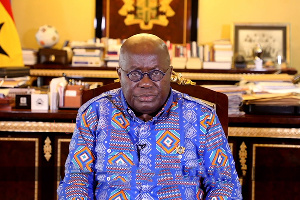President Nana Akufo-Addo has explained why Ghana’s COVID-19 recoveries more than doubled overnight on Saturday, 20 June 2020 by over 5,000.
In his 12th address to the nation on Sunday, 21 June 2020, Mr Akufo-Addo said: “Our approach to dealing with the virus, as I have always said, will be informed by the evolving science and data”.
“At the outset of the pandemic, the scientific community and the World Health Organisation (WHO), on 12 January 2020, recommended two main criteria for declaring someone who has tested positive as having recovered from the disease. The first is that you no longer have symptoms, and the second is that you are no longer capable of infecting others”, he noted.
“Initially”, the President continued, “the scientific thinking was that, as long you continue to test positive, you are capable of infecting others. Hence, the requirement for the two consecutive negative tests before you are declared as having recovered”.
“This was the science that informed the guidelines that Ghana has, so far, followed. However, there is now new evidence which states that, after ten (10) to fourteen (14) days, a person, with no symptoms, is unlikely to transmit the virus to others, even if the person continues to test positive”, the President said.
“It is on this basis that WHO has updated its guidelines, as published per its Clinical Management of COVID-19 Interim Guidance, of 27 May 2020, ‘as part of the clinical care pathway of a COVID-19 patient’. According to WHO, asymptomatic patients, i.e. those who have tested positive for the virus but are not exhibiting any symptoms after fourteen (14) days, ‘are not likely to be infectious, and, therefore, are unlikely to be able to transmit the virus to another person’”.
“After three (3) weeks of analysing and studying this update and recommendation, and situating it in the Ghanaian context, in line with the admonition by WHO to Member States, this new patient discharge/recovery policy has now been adopted by Ghana, as have some countries in the European Union, Singapore, India, Malaysia, Hong Kong, and in Dubai”, he told Ghanaians.
The President said as of Saturday, 20 June 2020, the total number of positives, cumulatively, stands at 14,154, out of the 270,300 tests conducted.
“Under the revised policy, 5,925 persons have recovered and been discharged”, he pointed out, adding: “This brings the total number of recoveries to 10,473”.
“The number of active cases is, thus, 3,596”.
He said: “In our hospitals and isolation centres, we currently have 24 persons severely ill, 6 persons critically ill, with 4 persons on ventilators” while “85 persons have, regrettably, died”.
The President said: “This increased number of persons being discharged from our isolation and treatment centres brings in its wake yet another issue that we have to deal with – stigmatisation”.
“It is obvious that stigmatisation is adding further dimensions to the already-difficult problem of the pandemic. Part of the reason for the spread of the virus is the reluctance of some persons to admit they have tested positive, and go into quarantine for fear of being stigmatised, and, in the process, continue to be agents of the spread of the virus”.
“Persons, who test positive for the virus, once they recover, do not pose any danger whatsoever to anyone, because the scientists tell us that they can no longer spread the virus. As I have said before, there is nothing shameful about contracting the virus, and, consequently, we do not have to lose our sense of community because of this pandemic”.
 Home Of Ghana News Ghana News, Entertainment And More
Home Of Ghana News Ghana News, Entertainment And More






